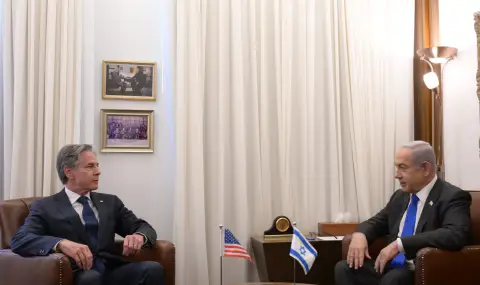US Secretary of State Anthony Blinken told Israeli Prime Minister Benjamin Netanyahu on Tuesday that Israel had not taken enough steps to get more humanitarian aid to Gaza. He asked him to work to improve the situation, said a high-ranking official of the State Department, quoted by "Reuters", quoted by News.bg.
Blinken held "extended talks" on the humanitarian situation in Gaza with Netanyahu and other senior Israeli leaders, who pledged to act on US demands, the official added, speaking on condition of anonymity.
The top US diplomat is in Israel as part of a wider week-long tour of the Middle East. However, Israeli information about the meeting did not mention that humanitarian issues were discussed.
Earlier this month, Blinken and Defense Secretary Lloyd Austin sent a letter to Israeli leaders demanding more steps be taken to improve the humanitarian situation in Gaza within the next month or face potential restrictions on military US aid. It was one of the strongest warnings since the conflict with Hamas began a year ago.
"The steps Israel has taken so far are not enough, and we made it clear today that we need to see more," the US official said.
"The Israelis are committed to fulfilling our demands and are doing everything possible to do so. We take these commitments seriously, but the results are important," he added.
The assurances the US official mentioned were missing from the Israeli statement about the Blinken-Netanyahu meeting. A State Department statement emphasized that Blinken had emphasized the need for Israel to increase humanitarian aid, while the Israeli report did not include such issues.
The amount of humanitarian aid entering Gaza has fallen to its lowest level for the year, according to UN figures. The UN also said Israel had blocked dozens of aid delivery attempts, particularly in northern Gaza, this month.
Israeli officials also assured Blinken that the country's policy does not include using siege tactics against Hamas in northern Gaza. A so-called "master plan" proposed by retired military commanders and some members of parliament this month calls for Palestinian civilians to be evacuated from northern Gaza, which would then be declared a closed military zone.
"They said it was absolutely not their policy... We said they should make that clear publicly. "I can't say whether they will, but we've heard a clear commitment that that's not their official policy," the US official said.
More than two weeks ago, Israel launched a broad military offensive in northern Gaza, particularly in Jabalia – the largest of the eight historical camps in the enclave. The aim was to prevent Hamas fighters from regrouping.
Residents reported that Israeli forces had besieged hospitals, schools and other shelters housing displaced families and ordered people to evacuate south. Israeli forces have detained dozens of men.
The Israeli military denies the evacuations are part of a wider plan, saying the aim is to separate civilians from Hamas fighters.
The total death toll in Gaza is approaching 43,000, according to the latest health ministry figures, with much of the population of 2.3 million displaced, many in makeshift shelters.
The Israeli offensive was triggered by a Hamas-led attack on Israel on October 7, 2023, in which about 1,200 people were killed and about 250 were taken hostage and taken to Gaza.
